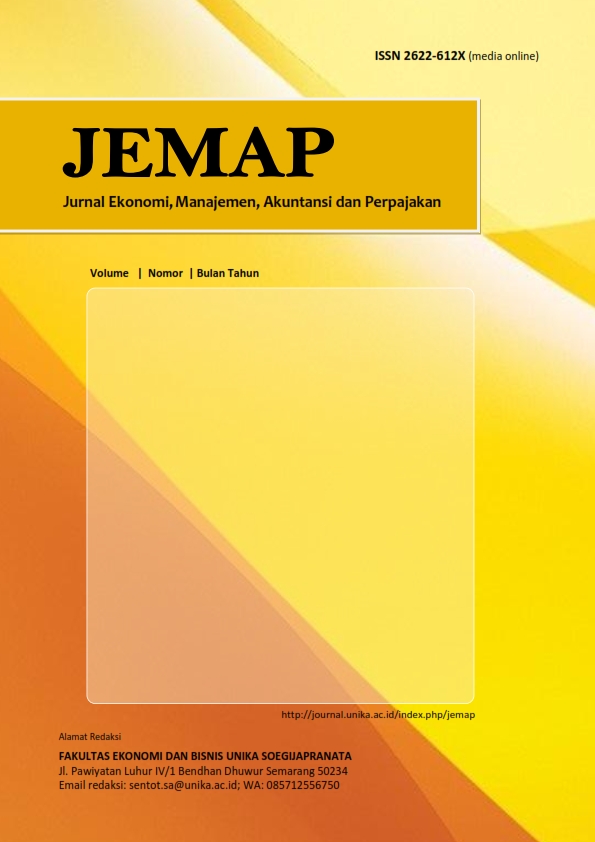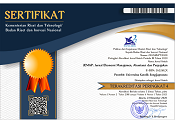Attitude Towards Green dan Enviromental Friendly Activity sebagai Pendorong untuk Meningkatkan Kunjungan ke Semarang Zoo
Abstract
Keywords
Full Text:
PDF (Bahasa Indonesia)References
Abbasi, G. A., Kumaravelu, J., Goh, Y. N., & Dara Singh, K. S. (2021). Understanding the intention to revisit a destination by expanding the theory of planned behaviour (TPB). Spanish Journal of Marketing - ESIC, 25(2), 282–311. https://doi.org/10.1108/SJME-12-2019-0109
Ahmad, W., Ghazanfar, S., Ibrahim, M., Nazim, M., Hussain Nadeem, A., & Yar Khan Pakistan, R. (2021). Consumer’S Purchasing Behaviour for Green Packaging in an Emerging Market. An Emerging Market. , Palarch’s Journal Of Archaeology Of Egypt/Egyptology, 18(8), 4792–4811.
Azam, A. N., Rashid, B., & Zainol, N. A. (2019). the Influence of Environmental Awareness and Customer Perceived Value on Tourist Revisit Intention: a Study on Green Resorts in Malaysia. Revista Turismo Estudos e Práticas - RTEP/UERN, 8(Special), 132–163.
Cortés, G. L. (2017). The influence of tourism experience self-congruity on the use of virtual social networks. European Journal of Tourism Research, 16(2), 154–176.
De Canio, F., Martinelli, E., & Endrighi, E. (2020). Enhancing consumers’ pro-environmental purchase intentions: the moderating role of environmental concern. International Journal of Retail and Distribution Management, 49(9), 1312–1329. https://doi.org/10.1108/IJRDM-08-2020-0301
Ekasari, A., Pratomo, L. A., Rahayu, F., Bangun, C., & Hidayat, D. P. (2023). Intention to Visit Sustainable Tourism Destination After Covid 19 Pandemic. Business and Entrepreneurial Review, 23(1), 1–18. https://doi.org/10.25105/ber.v23i1.16568
Fauzi, M. A., Hanafiah, M. H., & Kunjuraman, V. (2022). Tourists’ intention to visit green hotels: building on the theory of planned behaviour and the value-belief-norm theory. Journal of Tourism Futures, 5(3), 1–22. https://doi.org/10.1108/JTF-01-2022-0008
Ferdinand, A. (2014). Metode Penelitian Manajemen. Semarang: BP Universitas Diponegoro.
Ghozali, I. (2016). Aplikasi Analisis Multivariate dengan Program IBM SPSS 23 (8th ed.). Semarang: BP Universitas Diponegoro.
Gregoriades, A., Pampaka, M., Herodotou, H., & Christodoulou, E. (2023). Explaining tourist revisit intention using natural language processing and classification techniques. Journal of Big Data, 10(1). https://doi.org/10.1186/s40537-023-00740-5
Hair, J., Black, W. C., Babin, J. B., & Andreson, R. E. (2014). Multivariate Data Analysis. In Neuromarketing in India: Understanding the Indian Consumer (7th ed.). Harlow: Pearson Education Limited. https://doi.org/10.4324/9781351269360
Han, H. (2020). Theory of green purchase behavior (TGPB): A new theory for sustainable consumption of green hotel and green restaurant products. Business Strategy and the Environment, 29(6), 2815–2828. https://doi.org/10.1002/bse.2545
Hashim, R. A., Zakariah, Z., Mohamad, W., & Merican, S. (2013). Exploring Visitors’ Attitude towards Green Practices and Revisit Intentions of a Tourist Destination. Management, 3(7), 427–433. https://doi.org/10.5923/j.mm.20130307.13
Herman, L. E., Udayana, I. B. N., & Farida, N. (2021). Young generation and environmental friendly awareness: Does it the impact of green advertising? Business: Theory and Practice, 22(1), 159–166. https://doi.org/10.3846/btp.2021.12417
Jayasinghe, J. A. S. C., & Weerasekara, W. M. T. K. (2021). Impact of Green Attributes on Revisiting Intentions of Tourists in Sri Lankan Hotels: The Mediating Effect of Overall Satisfaction. Sri Lanka Journal of Marketing, 7(March), 1–24. https://doi.org/10.4038/sljmuok.v7i0.47
Joshi, Y., & Rahman, Z. (2015). Factors Affecting Green Purchase Behaviour and Future Research Directions. In International Strategic Management Review (Vol. 3). Holy Spirit University of Kaslik. https://doi.org/10.1016/j.ism.2015.04.001
Majhi, R. (2020). Behavior and perception of younger generation towards green products. Journal of Public Affairs, 2(3). https://doi.org/10.1002/pa.2288
Miranda, R., Escribano, N., Casas, M., Pino-Del-Carpio, A., & Villarroya, A. (2023). The Role of Zoos and Aquariums in a Changing World. Annual Review of Animal Biosciences, 11(2), 287–306. https://doi.org/10.1146/annurev-animal-050622-104306
Morais, D. B., & Lin, C. H. (2010). Why do first-time and repeat visitors patronize a destination? Journal of Travel and Tourism Marketing, 27(2), 193–210. https://doi.org/10.1080/10548401003590443
Mustafa, S., Hao, T., Jamil, K., Qiao, Y., & Nawaz, M. (2022). Role of Eco-Friendly Products in the Revival of Developing Countries’ Economies and Achieving a Sustainable Green Economy. Frontiers in Environmental Science, 10(7), 1–14. https://doi.org/10.3389/fenvs.2022.955245
Nam, C., Dong, H., & Lee, Y. A. (2017). Factors influencing consumers’ purchase intention of green sportswear. Fashion and Textiles, 4(1). https://doi.org/10.1186/s40691-017-0091-3
Nguyen, N. X., Tran, K., & Nguyen, T. A. (2021). Impact of service quality on in-patients’ satisfaction, perceived value, and customer loyalty: A mixed-methods study from a developing country. Patient Preference and Adherence, 15(8), 2523–2538. https://doi.org/10.2147/PPA.S333586
Nowacki, M., Kowalczyk-Anioł, J., & Chawla, Y. (2023). Gen Z’s Attitude towards Green Image Destinations, Green Tourism and Behavioural Intention Regarding Green Holiday Destination Choice: A Study in Poland and India. Sustainability (Switzerland), 15(10). https://doi.org/10.3390/su15107860
Puspitasari, A., Masy’ud, B., & Sunarminto, T. (2016). Nilai Kontribusi Kebun Binatang Terhadap Konservasi Satwa, Sosial Ekonomi dan Lingkungan Fisik: Studi Kasus Kebun Binatang Bandung. Media Konservasi, 21(2), 116–124.
Sugiyono. (2020). Metode Penelitian Kuantitatif, Kualitatif dan Kombinasi (Mixed method) (2nd ed.). Bandung: Alfabeta.
Sujood, Hamid, S., & Bano, N. (2021). Intention to Visit Eco-Friendlu Destinations for Tourism Experiences: An Extended Theory of Planned Behavior. Journal of Spatial and Organizational Dynamics, 9(4).
Sukawati, T. G. R., Astawa, I. P., Susyarini, N. P. W. A., & Sumawidari, I. A. K. (2019). Environmental Knowledge and Consumer Intention to Visit Green Tourism Village. Advances in Social Science, Education and Humanities Research, 354(iCASTSS), 165–169. https://doi.org/10.2991/icastss-19.2019.35
Sultana, N., Amin, S., & Islam, A. (2022). Influence of perceived environmental knowledge and environmental concern on customers’ green hotel visit intention: mediating role of green trust. Asia-Pacific Journal of Business Administration, 14(2), 223–243. https://doi.org/10.1108/APJBA-08-2021-0421
Wut, T. M., & Lee, D. (2023). Attitude-Behavior and Intention-Behavior Gap in Sustainable Tourism: a Review and Research Agenda. Global Fashion Management Conference, 511–511. https://doi.org/10.15444/gmc2023.05.10.01
Zebardast, L., & Radaei, M. (2022). The influence of global crises on reshaping pro-environmental behavior, case study: the COVID-19 pandemic. Science of the Total Environment, 811(1).
Zhou, G., Chen, W., & Wu, Y. (2022). Research on the Effect of Authenticity on Revisit Intention in Heritage Tourism. Frontiers in Psychology, 13(May), 1–11. https://doi.org/10.3389/fpsyg.2022.883380.
DOI: https://doi.org/10.24167/jemap.v7i2.12548
Refbacks
- There are currently no refbacks.
e-ISSN 2622-612X | View My Stats







